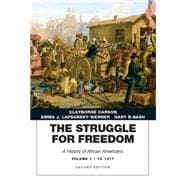
Clayborne Carson was born in Buffalo, New York. He received his BA, MA, and PhD from the University of California, Los Angeles, and has taught at Stanford University since 1974. Active during his undergraduate years in the civil rights and antiwar movements, Carson’s publications have focused on the African American protest movements of the post–World War II period. His first book, In Struggle: SNCC and the Black Awakening of the 1960s (1981) won the Frederick Jackson Turner Award from the Organization of American Historians. He has also edited Malcolm X: The FBI File (1991) and served as an advisor for the award-winning PBS series on the civil rights movement entitled Eyes on the Prize , as well as for other documentaries, such as Freedom on My Mind (1994), Blacks and Jews (1997), Brother Outsider: The Life of Bayard Rustin (2002), Negroes with Guns: Rob Williams and Black Power (2005), and Have You Heard from Johannesburg?. Carson is director of the Martin Luther King Jr., Research and Education Institute at Stanford, an outgrowth of his work since 1985 as editor of King’s papers and director of the King Papers Project, which has produced five of fourteen volumes of a comprehensive edition of The Papers of Martin Luther King Jr. The biographical approach of The Struggle for Freedom: A History of African Americans grew out of Carson’s vision. He has used it with remarkable results in his course at Stanford.
Emma J. Lapsansky-Werner
Emma J. Lapsansky-Werner received her BA, MA, and PhD from the University of Pennsylvania. From 1973 to 1990 she taught at Temple University, the University of Pennsylvania, and Princeton University. Since 1990 she has been a professor of history and curator of special collections at Haverford College. From her experience with voter registration in Mississippi in the 1960s, she became an historian to try to help correct misinformation about Black Americans. Her professional, research, and teaching interests—all informed by her concern for the African-American story--include family and community life, antebellum cities, Quaker history, and religion and popular culture in nineteenth-century America. Lapsansky-Werner has published on all these topics, including Back to Africa: Benjamin Coates and the Colonization Movement in America, 1848–1880 (2005, with Margaret Hope Bacon), Neighborhoods in Transition: William Penn’s Dream and Urban Reality (1994), and Quaker Aesthetics: Reflections on a Quaker Ethic in American Design and Consumption, 1720–1920 (2003). She is also a contributor to Yale University Press’s Benjamin Franklin, In Search of a Better World (2005) and to several anthologies on the history of Pennsylvania. She hopes that The Struggle for Freedom: A History of African Americans will help broaden the place of African American history in the scholarly consciousness, expanding the trend toward including black Americans as not just objects of public policy, but also as leaders in the international struggle for human justice, and participants in the development of our global community. Through stories, black Americans are presented as multidimensional, alive with their own ambitions, visions, and human failings.
Gary B. Nash
Gary B. Nash was born in Philadelphia and received his BA and PhD in history from Princeton University. He taught at Princeton briefly and since 1966 has been a faculty member at the University of California, Los Angeles, where he teaches colonial American, revolutionary American, and African American history and directs the National Center for History in the Schools. He served as president of the Organization of American Historians in 1994-95. Nash’s many books on early American history include Quakers and Politics: Pennsylvania, 1681–1726 (1968); Red, White, and Black: The Peoples of Early North America (Six editions since 1974); The Urban Crucible: Social Change, Political Consciousness, and the Origins of the American Revolution (1979); Forging Freedom: The Formation of Philadelphia’s Black Community, 1720–1840 (1988); Race and Revolution (1990); Forbidden Love: The Secret History of Mixed-Race America (1999; 2nd ed., 2010); First City: Philadelphia and the Forging of History Memory (2001); Landmarks of the American Revolution (2003); The Unknown American Revolution: The Unruly Birth of Democracy and the Struggle to Create America (2005); The Forgotten Fifth: African Americans in the Age of Revolution (2006); Friends of Liberty: Thomas Jefferson, Tadeuz Kosciuszko, and Agrippa Hull (2008); Liberty Bell (2010); and The American People: Creating a Nation and a Society (Eight editions since 1981. Nash wanted to coauthor this book with two good friends and esteemed colleagues because of their common desire to bring the story of the African American people before a wide audience of students and history lovers. African American history has always had a central place in his teaching, and it has been pivotal to his efforts to bring an inclusive, multicultural American history into the K–12 classrooms in this nation and abroad.
Preface
Meet the Authors
Chapter 1 Ancient Africa
Chapter 2 Africa and the Atlantic World
Chapter 3 Africans in Early North America, 1619–1726
Chapter 4 Africans in Bondage: Early Eighteenth Century to the American Revolution
Chapter 5 The Revolutionary Era: Crossroads of Freedom
Chapter 6 After the Revolution: Constructing Free Life and Combating Slavery, 1787–1816
Chapter 7 African Americans in the Antebellum Era
Chapter 8 African Americans in the Reform Era, 1831–1850
Chapter 9 A Prelude to War: The 1850s
Chapter 10 Civil War and the Promises of Freedom: The Turbulent 1860s
Chapter 11 Post Civil War Reconstruction: A New National Era
Appendix
Credits
Index
The New copy of this book will include any supplemental materials advertised. Please check the title of the book to determine if it should include any access cards, study guides, lab manuals, CDs, etc.
The Used, Rental and eBook copies of this book are not guaranteed to include any supplemental materials. Typically, only the book itself is included. This is true even if the title states it includes any access cards, study guides, lab manuals, CDs, etc.